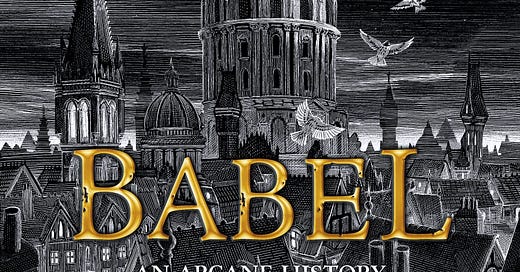Hey friends! I’ve got tons of book reviews piling up in my drafts so I’m thinking of scheduling them out for a weekly drop. This week, I'm diving into R.F. Kuang's historical fantasy novel, Babel, Or the Necessity of Violence: An Arcane History of the Oxford Translators' Revolution. As someone fascinated by both linguistics and how fiction can illuminate history's uncomfortable truths, this book hit all the right notes for me—though not without some challenging passages.
Where Translation Meets Revolution
Babel unfolds in an alternative 19th-century Oxford, where the magical art of translation powers the British Empire. The novel follows Robin Swift, a Chinese orphan brought to London by the mysterious Professor Lovell to study at Oxford's Royal Institute of Translation—the titular Babel. Within its silver-worked tower, Robin and his fellow students learn to craft "match-pairs": silver bars inscribed with words from different languages that, through their subtle differences in meaning, can manifest magical effects that fuel Britain's industrial and imperial might.
What makes Babel extraordinary is Kuang's seamless integration of linguistic theory, colonial history, and fantasy(so many footnotes lol). The match-pair system serves as both a fascinating magical device and a powerful metaphor for how language shapes power dynamics. Though, I do wish we leaned more into that aspect. It felt forgotten at times. Throughout the narrative, Kuang demonstrates a remarkable command of etymology and translation theory, making linguistic concepts genuinely thrilling rather than academic.
The novel's greatest strength lies in its unflinching examination of empire, racism, and exploitation. Robin and his friends—Ramy, Victoire, and Letty—form a diverse cohort that experiences Oxford's prejudices in different ways. Their journey from wide-eyed students to disillusioned adults reflects the choices faced by those caught between cultures during the colonial era.
Kuang's prose carries a precision and emotional weight that befits her themes. The descriptions of Oxford's dreaming spires contrast poignantly with the exploitation that funds them. The novel builds with the inevitability of Greek tragedy, examining how systems perpetuate themselves even through the hands of those who recognize their flaws.
If I have one critique, it's that the density of historical and linguistic detail occasionally overwhelms the narrative momentum. Some readers might find the middle sections academically heavy as Kuang thoroughly establishes her magical system and historical context. Additionally, a few character arcs don't receive the same depth of development as Robin's compelling journey.
Nevertheless, Babel achieves something remarkable: it transforms scholarly concepts about language and colonialism into a propulsive, emotionally resonant story. The novel asks difficult questions about complicity, resistance, and whether violence is ever justified when confronting entrenched systems of power. Most importantly, it refuses easy answers, leaving readers to grapple with these questions long after the final page.
For its ambitious scope, intellectual rigor, and emotional impact, Babel earns 4.5/5 stars from me. It's that rare kind of speculative fiction that changes how you see both the past and present, making it essential reading for anyone interested in the relationship between language, power, and resistance.
I'd love to hear your thoughts in the comments! See you next week.





